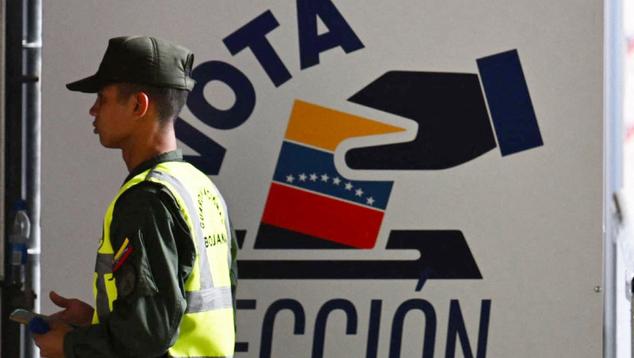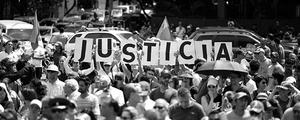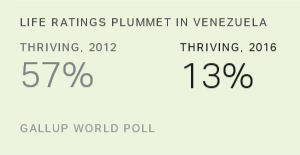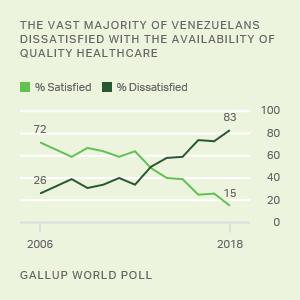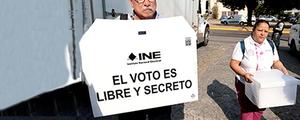WASHINGTON, D.C. -- President Nicolas Maduro’s fate isn’t the only thing on the ballot in Venezuela’s presidential election this weekend. The vote will also be a referendum on the “socialism of the 21st century” that has ruled the country and influenced its politics for a quarter century.
Years of failed economic policy, the erosion of democratic institutions and the repression of political dissent have deeply affected everyday Venezuelans, leaving them frustrated as they navigate a complex, unfolding humanitarian crisis.
Gallup’s polling in Venezuela over the past two decades underscores these frustrations: Majorities of Venezuelans struggle to afford food, do not feel safe where they live and question the honesty of their elections. And even though Venezuelans’ desire to leave their country has receded from record highs, more than a quarter still want to go.
Most Venezuelans Have Trouble Affording Food, Feel Unsafe
Years of food scarcity and hyperinflation after oil prices collapsed almost a decade ago continue to make even the most basic needs unaffordable for most Venezuelans. Today, Venezuela suffers from one of the highest rates of undernourishment in South America, according to data from the United Nations Food and Agriculture Organization.
Although fewer Venezuelans in 2023 said they were struggling to afford food than in 2016, when they were among the most likely in the world to say this, the 68% who struggle today is the highest percentage across Latin America. These struggles touch Venezuelans at all income levels; even 59% of the richest 20% say they have been unable to afford food at times.
In tandem with shortages of food and medicine at times and higher food costs, Venezuelans have also grappled with rising insecurity and violence. Although Venezuela no longer ranked as the least safe country in the world in 2023, more than half of Venezuelans today (54%) say they don’t feel safe walking alone at night where they live.
Venezuelans Lose Confidence in Elections on Maduro’s Watch
Venezuelans’ frustration with their inability to meet even the most basic needs could signal a strong desire for change. The opposition has rallied behind Edmundo Gonzalez Urrutia, a diplomatic figure propelled into the spotlight under challenging circumstances, as prominent opposition leaders, including Maria Corina Machado, have been banned from running. A recent Delphos-Andres Bello University poll shows Gonzalez Urrutia leading the race by at least 20 percentage points in its most pessimistic turnout scenario, which suggests the country could be on the verge of change.
However, the road to change has obstacles. Maduro's administration has a well-documented track record of undermining electoral integrity and sowing widespread distrust in the electoral process. In 2023, 26% of Venezuelans said they had confidence in the honesty of the elections in their country, which is low even for standards in Latin America, where median confidence was 38% last year.
Gallup's polling over the years has consistently reflected Venezuelans' lack of confidence in the honesty of elections since Maduro came to power after the death of Hugo Chavez in 2013. The opposition’s challenge is not just defeating Maduro’s maneuvers to manipulate the election, but also overcoming voter distrust in the electoral system.
Venezuelans’ Desire to Leave Still Double What It Was a Decade Ago
The world is likely to follow Sunday’s election with great interest, as the geopolitical implications of its outcome could have ramifications for Venezuela’s neighboring countries as well as the U.S. and other global powers. Nearly 8 million Venezuelans have sought refuge abroad, straining economies, social assistance programs, and safety across Latin American countries and sparking debates in U.S. politics about immigration policies.
While migration desires have cooled in Venezuela ahead of the election, dropping to 27% in 2023 from 41% in 2021, observers believe they could reach record-high levels again should Maduro manage to retain power. Despite the recent decline, Venezuelans’ desire to leave their country for good remains twice as high as it was before Maduro was first given power to rule in 2013.
Venezuelans’ desire to migrate largely aligns with net migration rates over the past several decades. For most of the democratic pre-Chavez era (1958-1998), net migration in Venezuela was positive (averaging +0.16). The average under Chavez was negative (-0.98), and the floodgates opened under Maduro (-15.89).
Venezuelans’ Ratings of Their Lives Improve, but They Still Haven’t Recovered
No country in the world has seen its people’s ratings of their lives fall as far and as fast as Venezuela did between 2012 and 2016. In 2012, the year before Maduro took office, 57% of Venezuelans rated their lives positively enough to be considered “thriving.” Fast forward to 2016, and this figure was just 13%.
Today, Venezuelans are feeling better about their lives, with 34% rating them positively enough to be considered thriving. However, this level is nowhere near those a decade ago, and Venezuela ties Bolivia for the lowest thriving numbers across Latin America.
For almost two decades, Gallup has asked residents of Latin American countries and the rest of the world to evaluate their lives on the Cantril Self-Anchoring Striving Scale, where zero represents the worst possible life and 10 represents the best possible life. Gallup classifies people as "thriving" if they rate their current life a 7 or higher and their life in five years an 8 or higher, and "suffering" if they rate both their current and future life situations a 4 or lower. Those in the middle are "struggling."
Bottom Line
As Venezuelans get ready to cast their ballots on Sunday, the stakes are incredibly high. On the election hinge the aspirations for a fresh start of Venezuela’s democracy, rebuilding of the economy, the country’s reconciliation, and long-awaited family reunifications.
Gallup's role in documenting public opinion and electoral dynamics offers critical insights into the challenges and aspirations driving this historic election. Whether Venezuela resumes the path of peaceful development and reconciliation or further sinks into turmoil and economic crisis is yet to be seen. This weekend’s election outcome will offer a glimpse into what’s to come for the country and its hopeful citizens. And it could also offer critical insight into the future of Latin America.
To stay up to date with the latest Gallup News insights and updates, follow us on X @Gallup.
For complete methodology and specific survey dates, please review Gallup's Country Data Set details.
Learn more about how the Gallup World Poll works.
